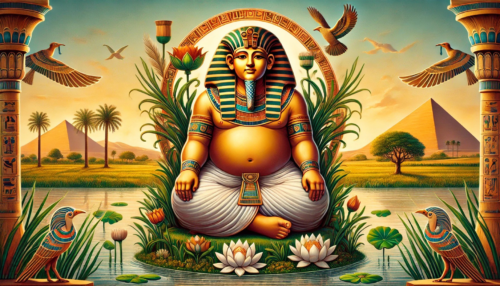Hapi is a god in ancient Egyptian mythology that represents the life-giving force of the Nile River. He is associated with fertility, prosperity, and abundance, as the flooding of the Nile was essential for the survival of the Egyptian people.
Depictions and Symbols
Hapi is often depicted as a plump man with large breasts and a potbelly, symbolizing fertility and nourishment. His rounded figure reflects the abundance brought by the Nile’s floods, which provided water and fertile soil for crops. He is frequently shown wearing a loincloth and sometimes adorned with plants such as papyrus (Upper Egypt) or lotus (Lower Egypt), signifying the unification of the two regions of Egypt.
Hapi’s appearance represents the balance and prosperity brought by the Nile’s annual inundation, making him a symbol of life and sustenance for the people of Egypt.

Roles and Attributes
Hapi’s most vital role in Egyptian mythology was as the god of the Nile River and its floods. The Nile’s annual inundation brought fertile silt to the land, allowing crops to grow and ensuring the survival of the population. Hapi was believed to control this life-giving flood, and the people worshipped him to ensure its timely arrival and moderation. An overly high or low flood could lead to famine, so Hapi’s favor was essential.
Hapi was also the god of fertility, not only ensuring the growth of crops but also protecting people from infertility. His blessings were sought for healthy children, fertile lands, and abundant harvests.
As a provider of food and water, Hapi was deeply connected to the concept of prosperity and abundance. His presence was a reminder of Egypt’s reliance on the Nile’s waters, and he was invoked during rituals and offerings to bring bounty and protect against drought.
Hapi was also associated with the afterlife, where he was believed to guide and protect the souls of the dead. He is sometimes depicted on coffins as a guardian, ensuring safe passage through the underworld.
Family and Connections
Hapi is sometimes described as a son of Horus, connecting him to the royal family of Egyptian gods. His ties to the Nile placed him as a figure of cosmic importance, bridging the life of the living world with the eternal flow of the river. Interestingly, Hapi is not a creator god or warrior figure like many other deities. Instead, his strength lies in nurturing and sustaining life, making him unique among the Egyptian pantheon.
Cult and Worship
Hapi’s worship centered on the city of Aswan, near the first cataract of the Nile. Aswan was considered the source of the river’s inundation, making it a natural place to honor the god. Rituals to Hapi included offerings of food, drink, and flowers, with priests invoking his blessings for a fertile flood season.
Hapi was often associated with statues and amulets, which were created to invoke his protection. Farmers, in particular, prayed to Hapi for successful harvests, while townspeople sought his blessings for prosperity and well-being.
